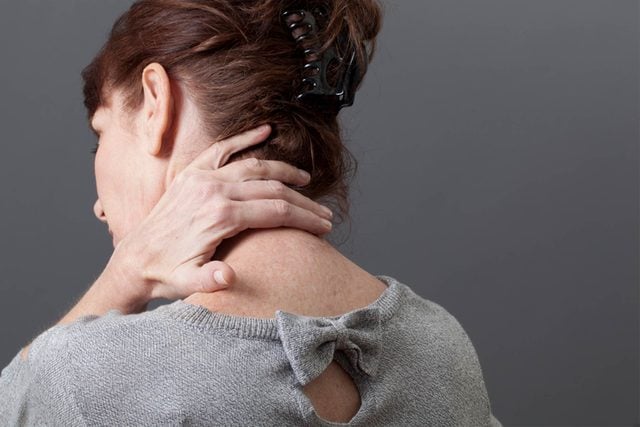Body Pain and Weight Gain Are Actually Signs of Stress
Leading neurophysiological experts explain how stress manifests in the body and what we can do to relieve it.
 Wondering where that random muscle pain is coming from? Take a look at your stress levels. According to experts, stress is much more than a mental issue—it can manifest and get stored in your body, causing serious physical problems.
Wondering where that random muscle pain is coming from? Take a look at your stress levels. According to experts, stress is much more than a mental issue—it can manifest and get stored in your body, causing serious physical problems.
What is stress?
Stress can be caused by all types of situations, whether it be work-related problems, family issues, social situations, or ongoing mental health battles.
“We lead fast lives nowadays, and the faster, newer, better technology is just exacerbating the problem,”said Dr. Lily Freidman, a family chiropractor based in Fort Lauderdale. “I hear about stress complaints from my patients more than ever, and I have been in practice for 18 years.”
With our new culture and rapidly changing lifestyles, getting stressed out is easier than ever. Do you compulsively check your email? Are you always in a rush, possibly without good reason? You can thank our new fast-paced tech-oriented mentality for that.
Dr. Elizabeth Trattner, national board certified doctor specializing in integrative medicine, explained the physiological cause of stress, and what it can do to our bodies. “When we are stressed, we make a hormone called cortisol. This has been part of our wiring for the thousands of years we have been on the planet. It was designed for when we had to fight or flight. Unfortunately, our bodies do not know the difference between running away from a bear and walking into a courtroom.”

Where does it manifest?
The effects of our production of high levels of cortisol can be felt all over the body. Dr. Trattner tends to see it manifest in the form of weight gain around the trunk of the body, while other practitioners see stress stored in various areas, like the neck, head, and shoulders.
“Stress in the body is real,” said Dr. Friedman. “I see it on a daily basis. It doesn’t discriminate between gender, profession, age etc, however, the location of the stress does in fact have a preference.”
She revealed that men often feel stress in the form of lower back pain, whereas women usually store it in their upper back, trapezius muscles, and neck. This often causes occipital headaches.
Even children are susceptible to storing stress in their bodies. “Children (yes, children!) have it mostly in their neck and mid back. Blame it on the cell phones and our constant connection to social media,” said Dr. Friedman.
More common physical manifestations of stress include headaches, digestive issues, muscle aches and pains throughout the body, and more.
Dr. David Clarke, President of the Psychophysiologic Disorders Association, says: “Headaches, low back pain, muscle aches, and gastrointestinal symptoms are the most common, but many more are possible—often several at once.”

How can we restore our bodies?
Aside from medical help, like regular chiropractic adjustments or mild painkillers, just talking about what’s currently stressing you out can alleviate your physical stress symptoms.
Many specialists say that disclosing the root of your stress in an open and safe setting, like therapy, can actually help remedy the physical manifestations of stress.
“A lot of my patients who come into my office with back or neck pain spend 45 minutes to an hour laying on my table and talking to me while receiving treatment. They state as they walk out the door that they ‘feel as if a huge weight has been lifted,’ not realizing that they have vented all their daily frustrations and left it on the table before leaving my office like a ‘new person,'” said Dr. Friedman.
This combination of physical relief and psychological relief is your best bet at calming your symptoms and releasing the stored stress. However, chronic pain might be caused by a deeper psychological issue, like trauma or anxiety.
“The key to relief is to recognize the source(s) of stress, though this is not always as straightforward as many might assume. Stresses that can cause symptoms that are often not considered include poor self-care skills, prolonged effects of childhood adversity, and undiagnosed cases of depression, PTSD, and anxiety,” said Dr. Clarke.
What are best practices?
Aside from professional neurophysiological help, there are things you can do today to ease your pain and reduce your stress levels fast. Dr. Friedman recommends some stress-reducing activities like light exercise such as yoga or jogging, walking in nature, and meditation. Even planning a vacation can help you feel better. (Here’s what really happens to your body when you’re stressed.)
Dr. Trattner recommends other cortisol-reducing tactics. “I teach patients to tend to and befriend their bodies with ritual, ceremony, cooking, and exercise. All of this lowers cortisol and helps increase the hormone oxytocin, the feel-good hormone. Normally it takes about a month to see the difference, but taking time out for oneself can really help battle cortisol.”
Taking these steps toward restoring your body and lowering your stress levels is an important investment in yourself. Feeling better, physically and mentally, will open up a brand new world for you.




